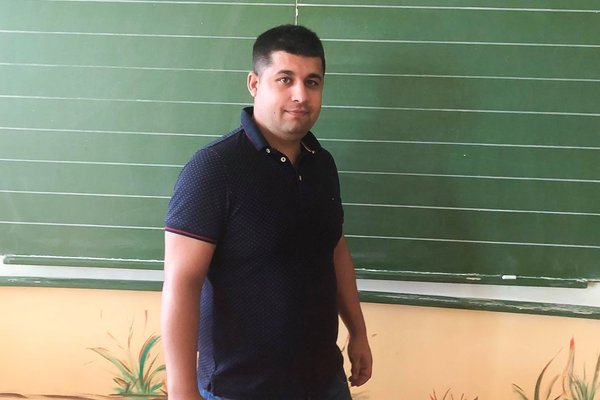
The National Roma Ministry of RCH called for nominations, in the third consecutive year, for the best Roma teacher or teaching assistant with Roma background. Awarded teachers are either member of RCH or working in one of the schools maintained by the Church. Based on the votes the Jury awarded Viktor Budai, teacher of the Erzsébet Sánta Primary School in Tiszakarád, a village of around 2500 inhabitants in Northeastern Hungary. Viktor comes originally from the city of Sárospatak. He went to college in Debrecen where he was member of the Wáli István Special Roma College of RCH. Today, he teaches mainly Roma children with the vision of offering them a chance for a better life and a successful career through education. In an interview we asked him about his adventurous life story, his professional career and dreams.
What does this award mean for you?
I have been looking for the right words since I got the news. My family was extremely proud of me. The nomination itself was a great honor, but me getting the award… I'm not yet over the surprise! I would like to thank my family and everybody who mentored my career, especially my teachers and my colleagues working in the school.
How did you decide to become a teacher?
I have had the feeling since high school that I wanted to work with children and before my school leaving exam, I had to make a choice. As I attended secondary school in Debrecen, and I knew and loved the city, it was expedient to stay there, so I applied to Ferenc Kölcsey Teacher Training College of the Reformed Church (that merged with the Reformed Theological University of Debrecen in 2011 – ed.)
Was there any specific reason why you chose this profession?
To be honest, I don't quite remember, I only recall that I liked the dynamics of the teacher-student relation in general. I had great teachers, and during secondary school I kept developing the passion for this profession.
You are currently teaching physical education and biology - why these two?
Officially I'm a Primary School Teacher with PE specialization. When the Erzsébet Sánta Primary School needed a biology teacher, I was given this subject, as well, and I really got to like it during the past two years. Therefore I'm thinking about starting an MA study, but it would be really hard beside working and raising two children - hence this is only a long term plan for me.
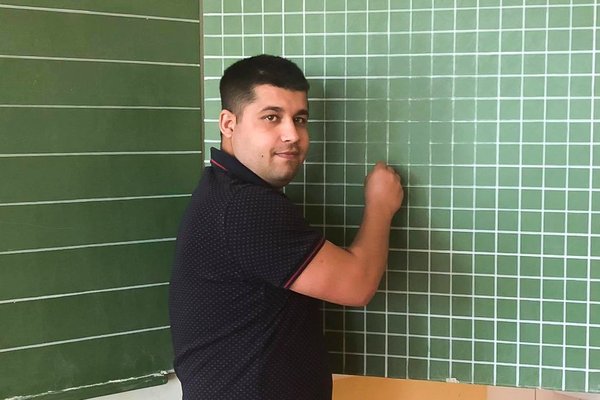
You had a long journey before getting to Tiszakarád. Would you tell us, what did you do before?
I finished my BA in 2013 and I didn’t really get any job offers. Therefore me and my wife, we did not hesitate long: we had a connection in Liverpool who suggested us to move over and offered us help in finding a job there. A week later our plane landed in England. The life over there was not easy at the beginning. In Liverpool locals speak English with a weird dialect, so I barely understood what they were saying. We had to wait one month to get a job: I did hard physical work in a warehouse of a store, but with an official contract, and that was the point. My wife worked in a chocolate factory for a year until she became pregnant with our little daughter. By the way, I have full respect for her former employer, who was very flexible. I consider the birth of my daughter a turning point in our lives because after that we started to think about returning home. I don't say we did not make a living there but we couldn't put money aside. Money does not grow on trees there too, and whoever says otherwise is lying.
How long did you stay there?
Our daughter was born in September 2016, and we stayed another 13 months in Liverpool. But we didn’t leave for home. My wife's godparents are living in Toronto, Canada, and they convinced us to move overseas. My brother-in-law worked for a construction company, I was able to get a job there. But after a year we decided to return home to Sárospatak.
What gave you the final push to return home?
We considered what is more important for us, money or happiness, the love of our country and our family. It was not a question which one we were going to choose. The home environment, the love of the grandparents cannot be replaced, and we did not want to take these from our children. We knew we would live a more modest, simpler life, but we would be also happier, and this was the only thing that mattered.
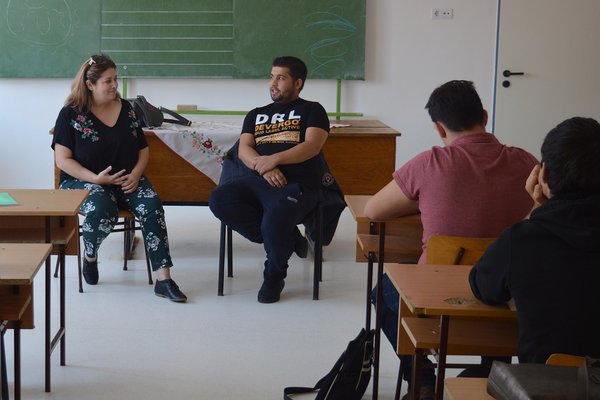
Interview with Viktor Budai during a Roma mission study tour of theology students of the Károli Gáspár University of the Reformed Church in Hungary in 2018
How did your family tolerate your absence?
Thanks to God we were supported from both sides of the family but they also confessed that they grew a lot older during our time away. We were happy that we could visit them once a year, but the returning seriously tried them and us.
How did you start a "new" life in Hungary?
Before we moved away, we were both living with our parents, so we were a little afraid of how we were going to start our common life at home. At first, we rented a social home provided by the municipality of Sárospatak, and then, thanks to the national family support system, we were able to buy a house in the city.
What were your chances in the job market?
Although we lived abroad, I was up to date with the news from home and it always crossed my mind that there are not enough teachers in Hungarian schools. Soon after our return, I went to the head of the School District Center in Sárospatak and I said that I didn't have any other preference than to be helpful and teach Roma children. This has ever been my desire. This is how Tiszakarád came into play.
Why was this your particular desire?
In the Wáli István Roma Special College that I attended in the academic year 2012/2013 we often heard that if we can, we should return to our hometown and try helping there. Then I took a vow: If I can do this, I will follow this advice. Until today I have been working in this spirit. I am grateful from the bottom of my heart that I can teach mostly Roma children in Tiszakarád.
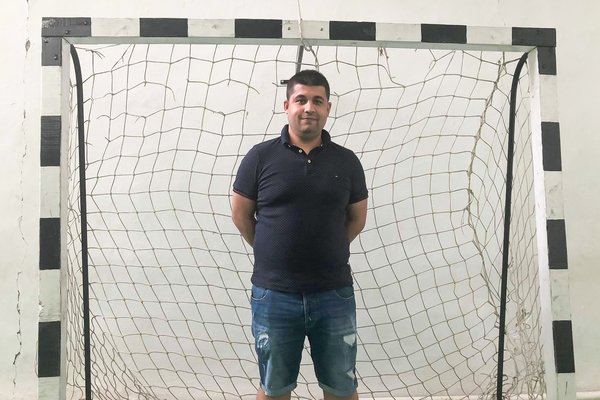
What should be done to encourage more children to consider the work you are doing as a real career path?
Unfortunately, one of the main reasons of the lack of their willingness is that in Hungary people are still full of prejudices. Look, in my closer community everybody knows me, everyone knows who I am, what I do, so I'm kind of respected.
Whenever I step out of this “comfort zone”, and I go to another town, then suddenly my skin color becomes my primary characteristic, my hallmark. I’m often confronted with this when I look after my official businesses, or when I'm at the post office or in a fast food restaurant. But the most upsetting is the exclusion from clubs and bars. The strongest argument against us returning home was actually the prejudice against Roma people. We did not feel this in Liverpool or Toronto, and we often wondered whether we would want our daughter to be exposed to this.
Why do you think there are no more young Roma role models in schools like you?
We talk a lot about this with my family, but I cannot give a precise answer. Maybe people lack a sense of mission to help their own community.
Do you see the result of you being a role model for the children?
In most cases, we are talking about children living in poverty, and their family background is not ideal either. In the school we can do many things for them, but I believe that the family is the first agent of socialization. We can only indicate them a direction which they can follow. Nevertheless, I believe that if only one in twenty children can break out of their current situation thanks to our efforts, we made a huge progress. If there is missing family background, we as “professionals” have to try to fill the gap as much as we can. I keep telling to my students that even after they graduated, they can always approach me with confidence. If I see that they have a problem, I try to help.
How is your relationship with the parents of your students?
I'm open for connections and cooperation – some parents are friendly, others are not. It is interesting to see that it is easier to get along with parents whose children are performing better in class. Otherwise, personal family visits can help a lot, although they are not always promising. It makes me feel good when some parents refer to me as a good example, saying their children; “see what Teacher Viktor has achieved as a Gypsy".
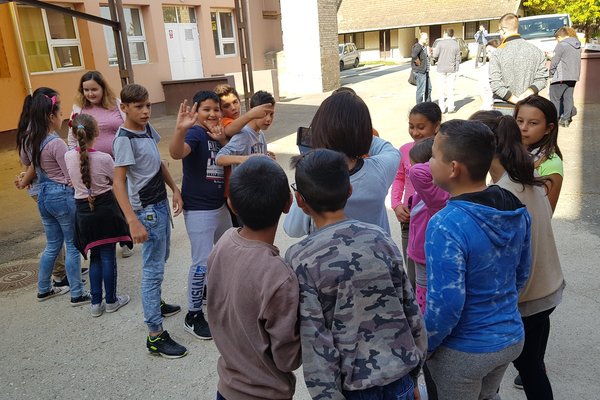
Students in the courtyard of the elementary school in Tiszakarád
We often hear about Roma people who choose to study and make an intellectual career that their own community would say them “you are not Gipsy anymore”. Have you experienced anything like this?
I have already been confronted with this phenomenon. In Sárospatak, my hometown, there was no problem because many people knew me and they knew that I'm open to all people. I never forgot where I came from. The situation was different in Tiszakarád, because at the beginning no one knew who I was. I sometimes hear from former fellow Roma College students that we are told to have become Hungarians; “we have Hungarianized”. They say it because we try to live a similar life like the majority of the society. But I have never been told that I'm no longer Roma.
What family background do you come from?
I can only speak of them highly. Both my father and my mother were raised in poor families, they were not educated, but what they offered me and my brothers everything they could, in terms of finances and spirituality, as well. They knew that I had a soft spot for soccer, so if I got a mark 3 (out of 5 being the best grade – ed.) in school I was not allowed to play. I bless them for supporting me regardless our limited opportunities, and raising me in a rigorous way. Education was so important for them that they graduated from high school at the age of 40.
What about the situation in the school, how was your relationship with your classmates?
During my time in primary school I only had one Roma classmate - my cousin. Since our school was the practice school of the local Teacher Training High School, there were many talented children coming from wealthy families. It was a big deal that Roma children were also admitted to study there. But as a result I didn’t have a Roma person who could have served as an example or role model.
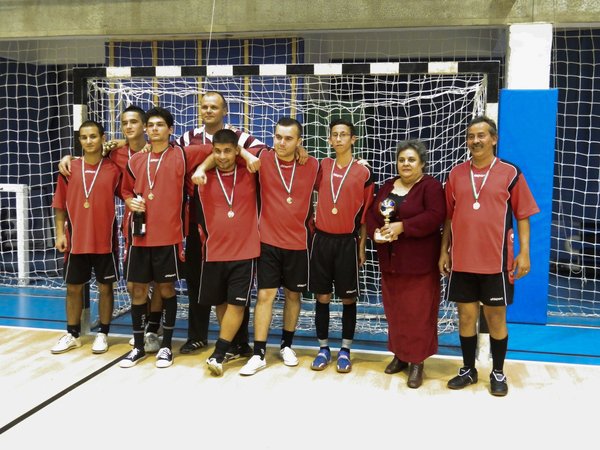
Soccer team of the Roma Special College in 2012
But in the Wáli István Roma Special College of RCH you had many, right? What kind of experiences can you recall from that year?
When I went to High School I first lived in the Maróthi student hostel of teacher training school, which shared the building the Roma Special College. The director of the student hostel informed me one day about the start of the new institution. At first I did not want to deal with it, because I was surrounded by such a good community. At the end of the academic year Anikó Uhrin, the former director of the Special College, invited me for a conversation and told me about the program and objectives of the Roma College and pointed out, why it was worthwhile for me to join this special student hostel. I had applied, and it turned out that I was the right decision. Living out our Roma identity consciously, coupled with Christian spirituality and extracurricular learning opportunities was a great mix. This is the reason why I keep saying that the network of Christian Roma Special Colleges is one of the greatest initiatives in our country.
The Christian Roma Collegium/Special College Network is a program that the Hungarian Government launched in 2011 in strategic cooperation with the Churches. RCH has two Reformed Colleges respectively in Debrecen and Budapest. Colleges provide support to Roma students in the form of financial aid, housing assistance, additional coursework and mentoring. Aside from academic opportunities, the students are encouraged to explore Roma spirituality and culture as well. Scholarships, social activities, as well as volunteering opportunities and community service are provided by the program. The special colleges aim to explore values of the Christian life as well as Roma culture and identity and encourages the Roma students to find their value and place in the world. Mentors monitor both academic and spiritual development. Ultimately, the Collegium hopes to send out well and holistically educated individuals into Hungarian society. The Collegium's programs are open for non-Roma students, but the institution offers accommodation and financial support to Roma candidates exclusively, as a very low percentage of Romas have the opportunity to study at universities or colleges.
Physically Distant but Close in Spirit
Special Roma Collegium's Life in the Time of Quarantine
Do you have a special memories from your College time, or a program that helped you the most?
The first Soccer Cup of the Roma Colleges in 2012 is one of those memories. We won the competition by a goal difference of 40 and I became the top goalscorer in the championship. Maybe this one is my favorite. But I keep every moment I spent there is good memory: cooking together, the conversations, birthday and name day parties, the weekends spent together. The list is long!
What would you say to those Roma or underprivileged children who regard their own situation as hopeless and cannot see any chance to break out. To those who don't even dare to have dreams, or gave up on reaching their goals?
They should never give up on their dreams, as they can achieve anything with persistence and diligence! I believe that today any Roma person who is willing to study, has the opportunity to do so. Children can even contact me if they need help! :)
What is your dream, your desire for the future?
I would like to start some kind of mentoring program for the children I teach, and it would be also great if we could somehow include soccer, because in my own experience it inspires and attracts the kids.
Looking at the wider society, I would very much like us to not only speak about integration, but to really implement it. I dare to dream, and I’m open to all initiatives which helps us move forward with integration!
Translated by András Tóth